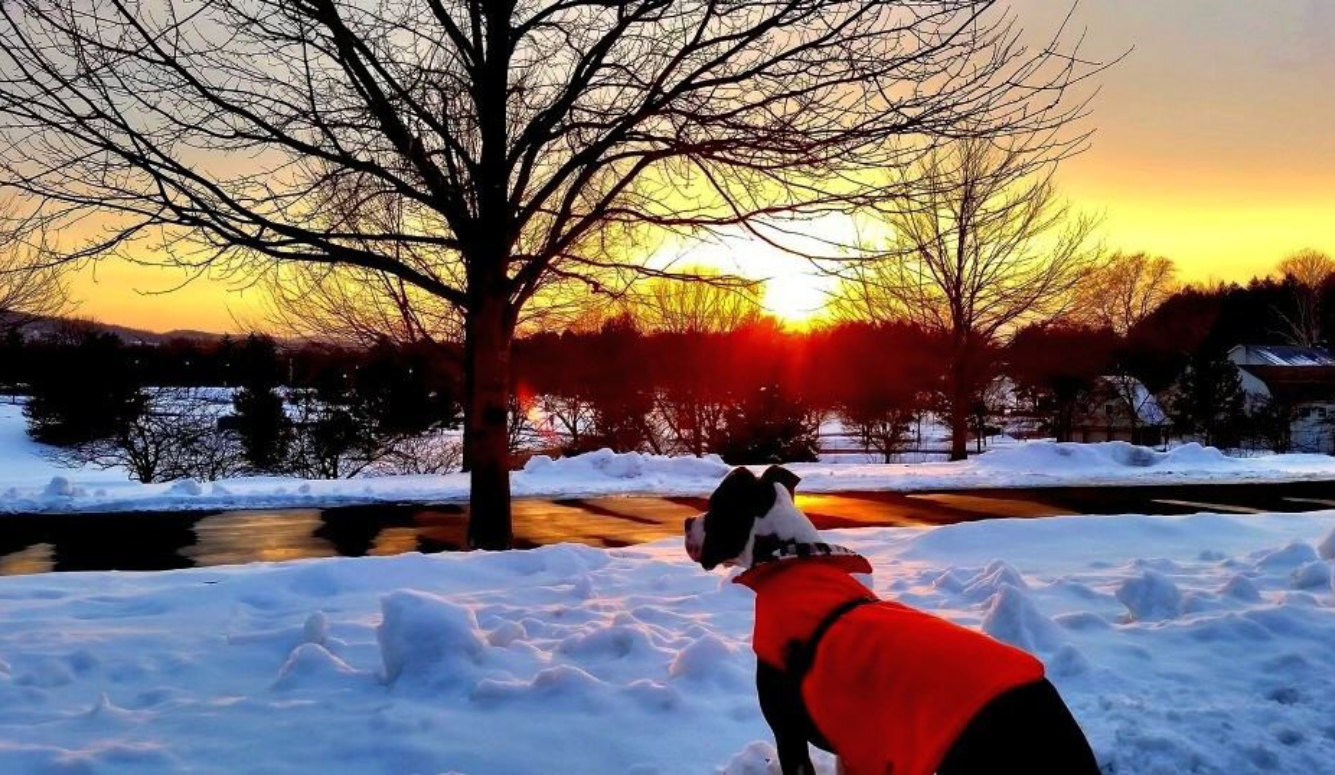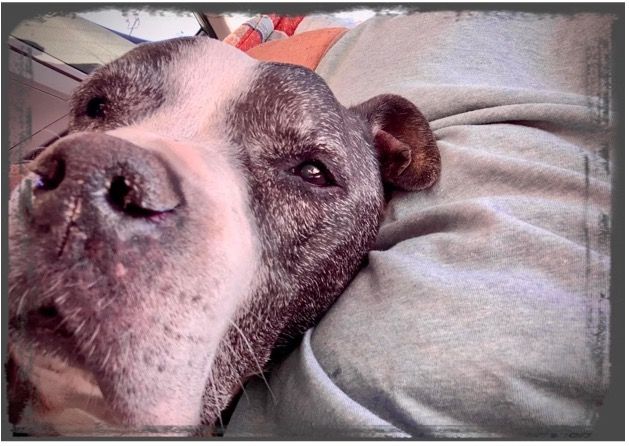Memoir
For a Time, a Pit Bull Gave Me Back My Son
If I couldn’t openly love him, I would love what he loved.

I did not expect my son to survive his teens. He was a tough kid, a kid with no give in him. From the time Graig could walk, the punishment did not exist that could deter him. Had my wife and I upheld even the most basic household rule book, there might not have been a waking hour when my son wasn’t in timeout, separated from his toys and video games. There might not have been a waking hour when things around the house felt normal.
Moreover, Graig was The Child Who Could Not Be Pleased. Congenitally restless and malcontent, he scorned the permissible, preferring the illicit, the inappropriate, the absurd. When his older half-brother got his driver’s license at 17, Graig, then 8, saw no reason why he should be denied similar privileges. He had taken it upon himself to read his brother’s driver’s ed manual, had passed sample written tests, and voiced confidence in his ability to maneuver his small body sufficiently to meet the requirements of a driving test.
There were remonstrations for months, each time his brother took the car out: “If I can do it, I should be allowed to do it. What does age have to do with it?” My wife and I had no doubt that had the law allowed, Graig would’ve moved out into his own place by age 10.
Therapists seemed more amused than alarmed by Graig’s tendencies, which they painted as curious, hyperactive, devil-may-care—labels whose charming overtones conjured images of a young Hugh Grant or Denzel Washington. Not a Mike Tyson or a John Dillinger.
As I was the chief explainer and-enforcer of life’s conventions, Graig and I spent much of our day, every day, at loggerheads. To mitigate this dynamic, I devised elaborate bonding experiences. These episodes, too, ended in disappointment or worse. Once or twice a year, I’d wholly abdicate my parental duties, let my son play hooky and organize an outing around his (theoretical) favorite activities—“Graig Days,” we called them—and still he’d break his mother’s heart by arriving home in a tearful rage over some trifle that hadn’t been to his liking.
Even time-honored family adventures ended in disaster for us. Graig tantrumed his way through Disneyland, finding fault with the lines, bemoaning the inauthenticity of the characters (“they look so fake”), and generally ruining an expensive day for me, my wife, his two older siblings, and any other children within earshot. Late in the day, a towering ice cream cone I’d just handed him slipped from his fingers and landed, splat, on the ground at his feet; from the keening that crescendoed from my son’s throat, you’d have thought the Goofy character had gone rabid and chomped down on Graig’s leg. As usual, he rebuffed my attempts at consoling him. (He occasionally accepted affection from his mother. Never from me.)
I could not defuse his outbursts without physically restraining him. But even that option evaporated as my son grew into a brawny behemoth: six-feet tall and well over 200 broad-backed pounds. When Graig’s temper redlined, he was a terrifying sight: eyes wide, lips pulled into a feral snarl, profanities exploding from his mouth at frightful volume and tempo.
We moved often, for my career. Graig left a trail of busted lips and broken noses stretching from coast to coast, assaulting “friends” who disrespected him and job supervisors who had the audacity to supervise him. One night in Indianapolis, after pistol-whipping some guy who’d made a smart remark about his date, Graig became the central figure in a long, destructive police chase: cars were sideswiped; pedestrians ran for cover. The pandemonium ended with a cop shoving a gun barrel into the nape of my son’s neck and growling, “It's over, asshole, don't make me fuckin’ shoot you.” The episode made the 11 pm news.
“Six months,” said the judge after a plea bargain a few weeks hence. My wife rationalized, “At least this puts him on pause. He’s got time to think about everything. Maybe it’ll turn him around.”
I was less sanguine, certain I'd someday get The Call, the one in the wee hours informing you that your child is on a slab somewhere, awaiting formal identification. While that most awful of calls never came, I did get others—from assorted jails and public defenders. One night the car I’d let him borrow for some unspecified emergency came home with a bullet hole in the rear bumper. (Would I never learn?)
Somehow, though, Graig made it through all that and eventually—of all things—decided to try his hand at stand-up comedy. After making something of a name for himself in the small pond of suburban Philly’s open-mic circuit, he undertook the obligatory comedian’s pilgrimage to Las Vegas to pursue his newly discovered dream.
One day not long afterwards, he called his mother and informed her that he’d gotten a puppy.
It was a pit bull. Of course it was.
My son named his new pet Benny Siegel in honor of the seminal Vegas mobster. (Of course he did.) He texted a picture of this black-and-white fluff-ball, still wearing the thick blue twine the sellers had tied around the pup’s neck to distinguish him from his litter-mates—who were all gone by the time my son inspected Benny in a Vegas garage.
On the phone with his mother, Graig replayed the scene with uncharacteristic warmth.
He recalled saying to Benny, “So nobody loves you, little fella? Well, I’ll give you a shot.” The seller asked $100; my son had $90, including coins. For that modest sum, a deal was struck that—at least for the bittersweet brevity of the life of a dog—changed things.
Benny Siegel the Pit Bull proved to be the antithesis of his owner in every way—most ironically in the area of obedience. Graig set about molding his new pet into a perfectly mannered housemate, imposing inflexible disciplinary standards of the sort that he himself never tolerated. By the time my wife and I flew to Vegas for mutual introductions some months later, Benny already knew not to beg for food or propel himself onto people’s laps. When called by his master, he ran over and sat politely. The one habit my son couldn’t refine out of Benny was face-licking. Admittedly, I undermined his best efforts, by laughing uproariously as the pup slobbered over every square inch of my facial surface area.
Benny’s face-licking, toy-bringing ways fast won over skeptics of the breed. Before long, my son’s comedy career stalled amid Sin City’s entertainment free-for-all, and he was forced to return to Pennsylvania, where he and Benny came to a family Thanksgiving. My older son’s wife knew that a dog would be present—but not the breed. Horrified to discover a pit bull in our midst, at first she stormed out of the house with their three young daughters in tow. But we persuaded her to give Benny the benefit of the doubt, and by the time the pumpkin pie was served she’d become the dog’s biggest booster, touched by his sweet-natured interactions with the girls.
When Graig lamented his pet’s unsuitability for the touring life, she chirped, “We’ll take Benny, then!”
As if to repay my daughter-in-law’s faith in him, Benny clambered up the stairs after lights-out, found the bed in which she and my older son were sleeping, jumped up, squirmed his way between them, and spooned her.
That Thanksgiving marked the first of two retreats home on my son’s part. He was not happy about having to come home—and it showed. Anyone in the room with us could feel the chill, palpably, as if someone had opened a window on winter’s wintriest day.
The climate warmed only when the subject turned to the dog. We could be talking about baseball and there’d be an edge in his voice as he ripped apart my take on a team or player, then I’d point out some silliness Benny was up to and Graig’s voice would soften. Then we’d slide back into baseball and the edge returned. We talked to each other civilly about Benny and Benny alone.
During these visits, which sometimes lasted for months, Benny became a furry proxy. If I couldn’t openly love my son, I would love what he loved—arguably the only thing he loved, as his relationships with women and alleged friends remained abysmal.
To watch Graig with Benny was to see someone I did not recognize.
Sometimes we would foster Benny while my son was off living the nomadic comedy life or looking for a new apartment. (Pit bulls are not a landlord’s preferred breed.) At one point, Benny lived with us for six months straight.
Our walks became the highlight of my day. He’d dart on and off the marked trails with crazy-quilt abandon, and dive headlong into streams, in which he hilariously struggled to swim against the current. I got a kick out of his regular pit fits, as the breed’s legendary paroxysms of energy are known: He’d run at full speed in wide circles, pausing at intervals to pirouette in the air. He also developed a special fondness for snow, which he never got to see in Las Vegas, of course; he’d hurl himself onto his back and execute the canine equivalent of a snow angel. Back at the house each night, the tongue-baths that disgusted squeamish onlookers became a ritual that Benny seemed to require in order to settle down for sleep. I made nightly reports to my son. If our dialog grew strained, I could always shift the focus to Benny’s latest exploits and Graig’s manner would brighten.
Benny happened to be staying with us a dozen years ago when I had a mild stroke. He became my therapy dog. Our walks grew longer, becoming part of my rehab. I don’t know if Benny had that special Spidey sense that will cause animals to act oddly around people experiencing health threats, but he couldn’t get close enough to me in the weeks that followed. Each night he’d hop up onto the recliner with me and nestle his 50 sinewy pounds into the hollow of my chest. When I described this behavior to Graig, he chuckled and asked me to put Benny on the line; he then instructed his dog, “Benny, it’s probably not a good idea to lay on grandpa’s aorta right now.”
Graig finally talked his way into stable employment as a comic gadfly on a Vegas drive-time radio show. (He’d delight his audience with whimsical references to his childhood foibles and eventual arrests.) I had to crate Benny up for the 4-hour flight west. Baggage handlers at the special pet-loading facility were perfunctory if not rough when loading him onto the conveyor belt that would eventually glide him out to the plane. His howls from the belly of the facility haunted me till I heard that he’d arrived safely in Las Vegas.
Though I missed him terribly, I drew strength from knowing that he was back with his master, thus once again giving Graig a life to be responsible for besides his own. The separation of master and pet had troubled me increasingly as the months wore on. I recalled reading a deposition cops once took from one of my son’s partners in crime. The young man had said, “Graig just doesn’t care. Whatever happens, happens. Live or die, he doesn’t give a fuck.”
I knew that as long as Benny was with him, my son would give a fuck.

Years later, my wife and I moved to Vegas ourselves. My presence and availability for dogsitting expanded my son’s career options, allowing him to take out-of-town gigs. This occasioned now-and-then overnights with his dog, which I didn’t mind one bit.
Benny had a special relationship with the desert. Out in the wide-open spaces, he’d cartoonishly chase jackrabbits over the glistening dunes and then leap high in the air upon noticing a circling vulture, as if intent on plucking the creature from the cloudless sky. When temporarily spent, he’d amble over for a long sloppy drink of the water I always brought along, then plop onto his side in the same sand that made my feet uncomfortably hot even through sneakers—in the direct midday sun. He’d lie like that for 10 minutes, till he caught his second wind. Or spied another jackrabbit.
When Benny had to do his business, he’d scout about for just the right cactus or tumbleweed, lift his leg to pee on it and then smoothly swivel his weight around into a crouched position with his hindquarters buried in the thorny vegetation. I could never understand how he didn’t mind having those barbs jammed into the most delicate area of his anatomy.
I planned themed outings for us, much as I’d once planned Graig Days, though the Benny Days ended in far greater satisfaction for all concerned. We might visit a desert oasis or one of the striated glacial hills that rise from the sand in stunning hues of mauve and tan, outlined in a mirage-like corona. He gamboled up the inclines effortlessly, pausing every now and then to look back and reassure himself that I wasn’t far behind.
But you know how it goes in families: Even when you live within easy driving distance, you don’t always make the drive; there will be extended intervals between gatherings. One such interval occurred in the months prior to last Thanksgiving. So when Graig and Benny arrived for dinner, I was taken aback by how the dog’s appearance had changed over the intervening months. His whiskers had gone almost completely gray. He seemed sluggish. A veterinarian had already seen Benny and found nothing alarming. “He’s coming up on 13, it’s probably just some nonspecific geriatric thing,” the vet told my son, while prescribing some low-level meds “to help with some of his symptoms.” Graig blamed the meds for worsening Benny’s lethargy and would entertain no alternative theories about his pet’s medical status. We made plans to take Benny to his favorite romping spot, one of those glacial hills, the next week.

Man and dog were waiting outside when I pulled up for the scheduled event—and now I was shocked at Benny’s condition. He needed to marshal every ounce of strength to climb up into the car. Once on the seat, he lay quietly on the blanket I’d provided instead of toggling from window to window while vocalizing loudly in his habitual fashion.
At our destination, Benny got out of the car only with some urging. Rather than scampering up the hill’s lower reaches, as was his wont, he walked to an aloe plant within mere yards of the car, lifted his leg unsteadily, then trudged back toward the car. Gone was the loose-limbed gait I remembered. Graig shrugged. “I guess he’s done here,” he said. He blamed the ongoing drug regimen and voiced the expectation that his pet would be “his old self again” soon.

Benny hadn’t been eating his kibble, so on the way back Graig asked to stop at a supermarket to get some sliced deli chicken to mix in. While he ran into the store, I slid into the back seat next to my old friend. Benny at first plopped his head onto my hip and then, after a moment, struggled to his feet on his front legs only. He gave my face a few phlegmatic licks, barely poking his tongue out between his canines. I held his weathered face in my hands and kissed him on the snout, beginning the process of preparing myself to lose him. He crumpled back down onto my hip. I choked up.
I then got back into the driver’s seat and composed myself, knowing that Graig would not appreciate the sight of his wet-eyed father cradling his enfeebled pet.
Benny Siegel the Pit Bull left us four days later, early on the morning after his thirteenth birthday. As soon as I saw the caller ID I knew. Graig almost never calls me, let alone before 7 am. His voice cracking, he said, “I just thought you should know, Benny died this morning.”
He just thought I should know.
I cried for the better part of an hour. And then on and off for weeks.
Graig and I have had exactly one in-depth conversation since. Three months after Benny died, my son took me to a birthday lunch that felt forced throughout and ended in a heated argument over politics. As soon as he had paid the check, he got up and tromped out the door, mumbling profanities back at me over his shoulder.
Watching him go, I thought: Maybe someday I’ll have prepared myself to lose Benny. And to face the fact that I have lost, along with him, once again, my boy.






